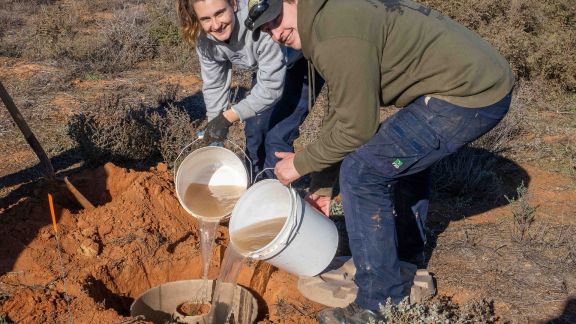Researchers tackle challenges of harsh arid zone conditions
16 August 2024

In the often harsh and dry habitat of far western New South Wales, many plant species face substantial challenges in their germination, growth and survival. Constantly in battle with the elements, plants are also under regular attack from native and exotic animals throughout the region.
The region is home to Federation's Nanya Research station, the 40,000-hectare property that includes a natural salt lakes complex, old-growth Mallee vegetation and a variety of intact ecosystems, making it a significant location for biodiversity conservation. Federation researchers have worked at the station for several years, focusing much of their work on restoring semi-arid and arid zone woodlands.
Like many other parts of the country, rainfall is unpredictable, sporadic and patchy. Land clearing by graziers on nearby properties has compounded the impact of grazing there, leading to minimal germination of critical Mallee woodland species. The environment and presence of the animals that feed on the plants, referred to as total grazing pressure, make it almost impossible for new plants to survive.
Federation researchers are trialling an innovative tool they hope will enhance the growth Mallee woodland species seedlings in the environment.
Researchers recently placed 200 arid zone woodland seedlings in cocoon incubate planters – a product made from recycled cardboard that holds 25 litres of water and is designed to provide the water during the critical part of their growth in harsh environmental conditions while shielding them from grazing animals and other invasive species.
The researchers also planted another 200 seedlings in the same area without the cocoon incubate planters for comparison.
The planters include a lid to reduce evaporation, and the seedlings are put into the middle of the planters with soil and any suitable nutrients needed, with the expectation that the system will allow the seedlings to survive their crucial early phase.
Restoration ecologist and co-director of the Future Regions Research Centre Professor Singarayer Florentine says the cocoon incubate planters have been successfully used in Middle Eastern countries with extreme temperatures and have also been trialled at various sites in Australia.
He says the results of the current project at Nanya could offer a potential solution and draw interest from mining companies facing challenges in restoring arid woodlands at their operation sites.
 "We can grow many seedlings in a nursery and plant them in those environments but the survival rate of those seedlings is very low. We planted around 150 arid woodland seedlings within the exclosure at Nanya Station a few years ago, and currently, we can see only four or five individual plants that have survived," Professor Florentine said. "To restore an arid woodland at landscape scale level is difficult".
"We can grow many seedlings in a nursery and plant them in those environments but the survival rate of those seedlings is very low. We planted around 150 arid woodland seedlings within the exclosure at Nanya Station a few years ago, and currently, we can see only four or five individual plants that have survived," Professor Florentine said. "To restore an arid woodland at landscape scale level is difficult".
"There are many techniques available in restoration ecology, like broadcasting seeds and planting seedlings. You can reduce the grazing pressure, but in an arid zone, none of these facilitates woodland species' establishment and subsequent survival effectively."
Arid zone woodlands comprise ground layers, including shrubs, and the canopy layers, each playing a crucial role in the ecosystem. Woodlands provide habitat for a range of threatened species, reduce evaporation rates, and offer resources for various animal species, making them indispensable for maintaining the integrity and structure of the arid zone.
"Intact vegetation is essential because the fauna species, the birds and the insects associated with that rely heavily on habitat for their survival," Professor Florentine said.
"Many mining activities are going on in arid zone parts of Australia and we know that mining companies have struggled to get arid woodland species successfully back into the land they have mined as part of their commitments.
"Before they can put a shovel in the ground there is often an agreement that, at the end of mining activity, they must continue rehabilitating that land before it is passed back to the government.
"This is a challenge for them as well, and it's not a criticism of the mining companies or pastoralists – as researchers, we need to find a better way to encourage woodland species to grow to cover these vast areas."
The research team are hopeful the trial will yield a much higher success rate than can otherwise be achieved using the other methods that are highly successful in less harsh conditions but struggle in arid zones.
"In a tropical climate, you can plant a seedling and put up a protective guard, add a bit of water, walk away and come back after six or eight months, and the tree might be a few metres tall, Professor Florentine said.
"But in an arid zone, if you plant a seedling, and even if there is continuous rainfall, the seedling which may be 10 centimetres or 15 centimetres initially, and if you come back after four or five years, it will be 50 centimetres or at maximum 100 centimetres tall. They have very slow growth.
"We're hopeful this method will work because the planter will prevent threats from grazing. In an arid zone, for woodland species to germinate and survive, they need more than average rainfall for the first year and the subsequent two or three years.
"Now, we must mimic that in nature, and the cocoon planter will give us the best chance."
Related reading:
Protecting Australia's arid woodlands
Chronicling endangered species on Nanya – a vast biodiversity treasure
Innovative roots ripping process to protect Australia's arid woodlands


